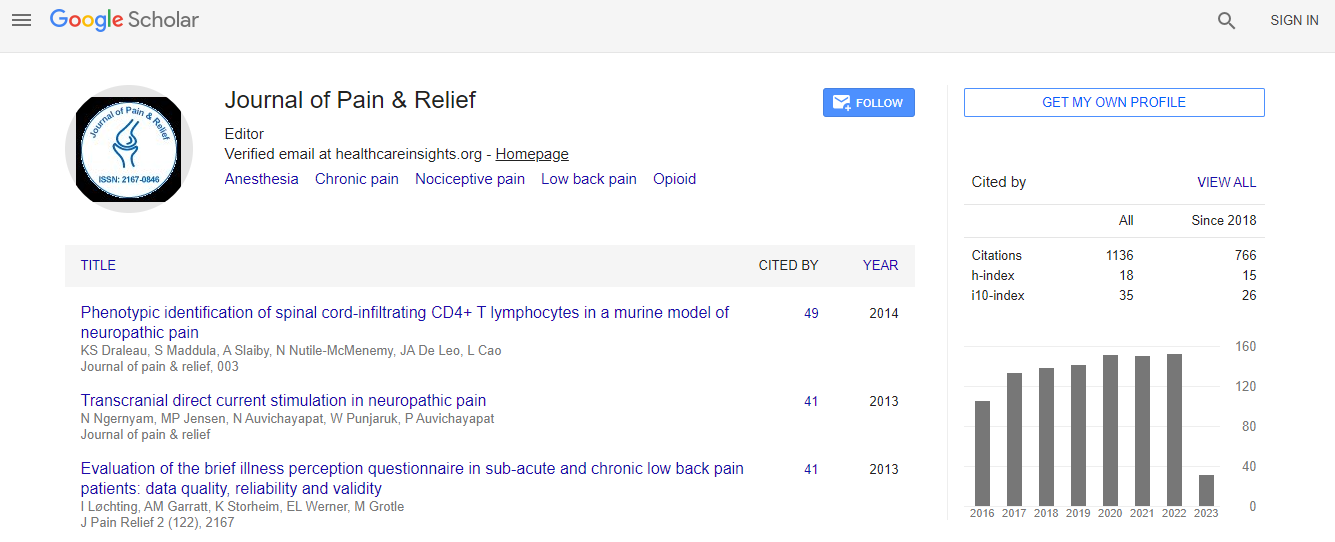Our Group organises 3000+ Global Conferenceseries Events every year across USA, Europe & Asia with support from 1000 more scientific Societies and Publishes 700+ Open Access Journals which contains over 50000 eminent personalities, reputed scientists as editorial board members.
Open Access Journals gaining more Readers and Citations
700 Journals and 15,000,000 Readers Each Journal is getting 25,000+ Readers
Recommended Conferences
42nd Global Conference on Nursing Care & Patient Safety
Toronto, CanadaGoogle Scholar citation report
Citations : 1556
Journal of Pain & Relief received 1556 citations as per Google Scholar report
Journal of Pain & Relief peer review process verified at publons
Indexed In
- Index Copernicus
- Google Scholar
- Open J Gate
- Genamics JournalSeek
- Cosmos IF
- RefSeek
- Hamdard University
- EBSCO A-Z
- OCLC- WorldCat
- Publons
- Geneva Foundation for Medical Education and Research
- Euro Pub
- ICMJE
Useful Links
Recommended Journals
Related Subjects
Share This Page
The impact of the gut microbiome on host fatigue in ME/CFS patients
International Conference on Fibromyalgia and Chronic Pain
Christopher William Armstrong
The University of Melbourne, Australia
ScientificTracks Abstracts: J Pain Relief
Abstract
Myalgic encephalomyelitis/chronic fatigue syndrome (ME/CFS) is a debilitating long-term multisystem disorder that centres around fatigue that is inexplicably persistent in its severity and its inability to be relieved by rest. Gut dysbiosis, energy metabolism issues and oxidative stress are focal points of ME/CFS research. We have completed a metabolomic study that has enabled the observation of these issues through the metabolic analysis of blood serum, urine and feces with the quantitation of fecal microbes. We present a workflow for studying associations between gut bacteria and the host metabolism by using correlational analysis within the ME/CFS and healthy control cohorts. Samples were collected from a cohort of 34 females with ME/CFS (34.9�±1.8 SE years old) and 25 healthy non-ME/CFS female participants (33.0�±1.6 SE years old) and all samples underwent metabolic profiling via 1D 1H NMR spectroscopy experiments. In the healthy control group we observed a strong association between fecal short chain fatty acids (SCFAs) and many metabolites in the blood and urine highlighting the potential impact of diet on host metabolism. In the ME/ CFS cohort, blood glucose was elevated while blood lactate, urine pyruvate, and urine alanine were reduced indicating a glycolysis anomaly. The increase of blood aspartate and decrease of blood glutamate suggest an increase in gluconeogenesis. The increase of fecal SCFAs appears to be positively correlated with enhanced gluconeogenesis within the host, which suggests that gut bacteria may play a role in the fatigue phenotype of ME/CFS sufferers.Biography
Christopher William Armstrong is pursuing his PhD at the University of Melbourne in the Department of Biochemistry and Molecular Biology. His focus has been on the development of metabolomic methods for studying the impact of the gut microbiome on health with a focus on ME/CFS. He has conducted two separate case-control studies and is now beginning a longitudinal study using personalized-omics methods to define ME/CFS as it pertains to the individual. He has 4 first-author publications to date.
Email: acw@pgrad.unimelb.edu.au

 Spanish
Spanish  Chinese
Chinese  Russian
Russian  German
German  French
French  Japanese
Japanese  Portuguese
Portuguese  Hindi
Hindi 
